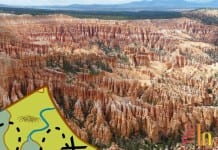
Gubernatorial candidates in 2020 lack knowledge about water and Lake Powell Pipeline
It was made clear at the recent economic summit that all Utah gubernatorial candidates support the proposed Lake Powell Pipeline. But with what do they back up that support? Have they actually studied the project? Or are they merely listening to those who have promoted the projected for the past 14 years, during which more than a few problems with the project have been identified?
I certainly would expect Greg Hughes to support the project. He’s been in the thick of it with other proponent legislators and the Utah Division of Water Resources during his legislative time. But as a Utah citizen and voter, I expect candidates to delve into facts on both sides of the argument rather than buy the story that Lake Powell Pipeline proponents, water districts, the Utah Division of Water Resources, developers, and the hordes of water lobbyists are selling. Candidates should be willing to look fairly at the issue before committing themselves.
Candidates assert that we must get our Colorado River water and have sufficient water for kids to live here. This is the same tired rhetoric I’ve been listening to since 2006 when I started following and studying this project. Have the candidates actually read the 22 study plans? Have they been aware of the 2014 and 2015 state audits that have questioned Utah Division of Drinking Water and Utah Division of Water Resources water data — much of which is still being used to support the Lake Powell Pipeline? Are they aware that there are problems with over allocation of the Colorado River water due to reduced flows? The river is not running at the 15–16 million acre-feet per year, upon which the 1922 Colorado River Compact allocations to the Lower and Upper Basin states were predicated. Utah’s 23 percent of the Upper Basin water is considered by many in jeopardy already. Utah’s own State Engineer Kent Jones has admitted that Utah’s water is over allocated. The recent Drought Contingency Plan agreed to by all Colorado River basin states only takes us to 2026 when renegotiation efforts will begin again.
So are these candidates, including Jon Huntsman (in whom I have perhaps placed more faith than warranted), blithely supporting the Lake Powell Pipeline with little or no study? Jon Huntsman was Utah Governor from 2005 to 2009 during which the Lake Powell Pipeline Development Act was passed and early work with the Federal Energy Regulatory Commission began. He was involved in the early stages, but has he really dug into details following that time?
When the Lake Powell Pipeline project was started officially in 2006 by passage of the Lake Powell Pipeline Development Act, the project was estimated to cost $350–450 million. Now its high is around $1.8 billion, and who knows where actual construction costs and interest on bonds will take it? The 2006 act passed unanimously, but some have broken ranks over the past few years as some legislators actually see the folly in funding this project.
The state’s 2011 Water Needs Assessment submitted to the Lake Powell Pipeline licensing agency (at that time, the Federal Energy Regulatory Commission) used a 2060 population projection of 860,378! The latest 2060 projection from U of U’s Kem C. Gardner’s Policy Institute is just under 500,000. We have come down nearly 400,000 from the 2011 projection that was used to justify the Lake Powell Pipeline.
Are candidates paying attention to this? They should be. Because our available local resources and planned projects — without the Lake Powell Pipeline — will provide nearly 100,000 acre feet of water annually according to state reports and our own district, enough to support that 500,000 population with reasonable water use, not our current 300 gallons per capita per day!
Are they worried about the 50,000 annual visitors and second homes in our area? Other desert communities such as Las Vegas and Phoenix, which use less water than we do on a per capita basis, also have many visitors and second homes. Some say we cannot be compared to other areas, but we must and can through a process called “normalization” that would allow an apples to apples comparison. Are candidates asking for that analysis? They should because how can we strap this state and our county specifically with the exorbitant cost unless we know the answers to these important questions?
Are they looking at what opportunities water reuse has for extending our area’s water supply? They should, because — as presented to the current governor’s Executive Water Finance Board by South Jordan’s mayor — there are real opportunities in reuse that could prove cheaper than the expensive, risky, and unnecessary Lake Powell Pipeline.
Do they know that the Sand Hollow aquifer beneath Sand Hollow Reservoir holds over 130,000 acre feet of water and that that amount is growing to an eventual capacity of 300,000 acre feet?
What else don’t our 2020 gubernatorial candidates know about our area’s water needs, supply, options, and preferences?
A handout provided at Governor Herbert’s Executive Water Finance Board September 2018 meeting details problems associated with the project’s financing, including the large state taxpayer subsidy that would result from the long time period over which the state’s loan would be repaid by Washington County citizens. This adds to burdens for “real” needs the state is facing regarding our tax base and could require taking money from education or transportation. Governor Herbert recommends better water data and data reporting, meaningful water efficiency targets, independent validation of water use and costs, increased emphasis on user fees, and transparency and local voter engagement through public processes — things that average citizens have been clamoring for, too.
Many citizens want a vote on this matter. What these current candidates don’t know can hurt us. We deserve better.
The viewpoints expressed above are those of the author and do not necessarily reflect those of The Independent.
How to submit an article, guest opinion piece, or letter to the editor to The Independent
Do you have something to say? Want your voice to be heard by thousands of readers? Send The Independent your letter to the editor or guest opinion piece. All submissions will be considered for publication by our editorial staff. If your letter or editorial is accepted, it will run on suindependent.com, and we’ll promote it through all of our social media channels. We may even decide to include it in our monthly print edition. Just follow our simple submission guidelines and make your voice heard:
—Submissions should be between 300 and 1,500 words.
—Submissions must be sent to editor@infowest.com as a .doc, .docx, .txt, or .rtf file.
—The subject line of the email containing your submission should read “Letter to the editor.”
—Attach your name to both the email and the document file (we don’t run anonymous letters).
—If you have a photo or image you’d like us to use and it’s in .jpg format, at least 1200 X 754 pixels large, and your intellectual property (you own the copyright), feel free to attach it as well, though we reserve the right to choose a different image.
—If you are on Twitter and would like a shout-out when your piece or letter is published, include that in your correspondence and we’ll give you a mention at the time of publication.
Articles related to “Gubernatorial candidates in 2020 lack knowledge about water and Lake Powell Pipeline”
Lake Powell Pipeline pipedream is nothing more than a nightmare



